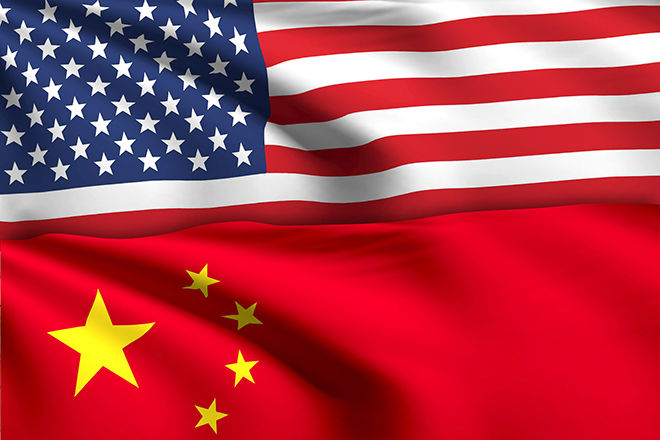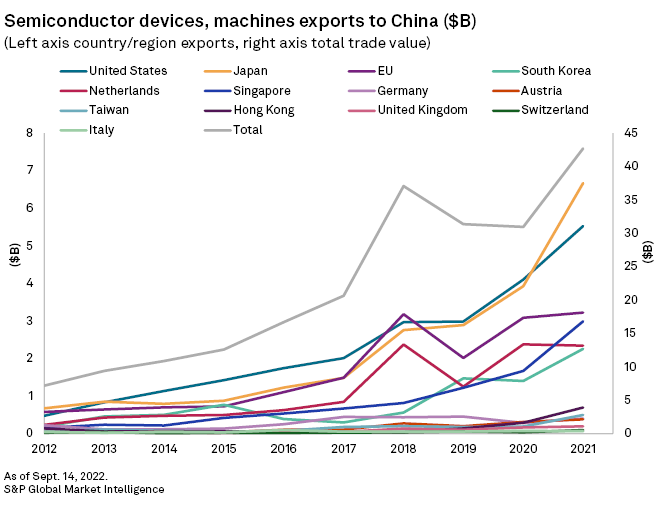S&P Global Offerings
Featured Topics
Featured Products
Events
S&P Global Offerings
Featured Topics
Featured Products
Events
S&P Global Offerings
Featured Topics
Featured Products
Events
Banking & Capital Markets
Economy & Finance
Energy Transition & Sustainability
Technology & Innovation
Podcasts & Newsletters
Banking & Capital Markets
Economy & Finance
Energy Transition & Sustainability
Technology & Innovation
Podcasts & Newsletters
S&P Global Offerings
Featured Topics
Featured Products
Events
24 Oct, 2022
By David DiMolfetta and Stefan Modrich

|
The proposed restrictions against China would follow earlier export control measures taken by the U.S. Commerce Department this month. |
The Biden administration is exploring a new round of export controls that would blunt China's access to American artificial intelligence and quantum computing equipment, according to a person who has participated in discussions with the White House.
The White House is also crafting an executive order that would enable reviews of outbound investments toward Chinese AI and semiconductor companies from the U.S., said the individual, who asked to not be identified because they were not authorized to speak about the matter. The EO remains in the early stages and does not yet include detail on the types of investments or specific technologies that would be subject to scrutiny.
Additionally, the person said the administration is considering draft proposals for European allies. The White House did not respond to a request for comment. The National Security Council, which advises the president on matters of national security, military and foreign policy, also did not respond to a request for comment.
In response to questions about the restrictions, the Commerce Department referred S&P Global Market Intelligence to an Oct. 7 statement from Alan Estevez, the under-secretary of commerce for industry and security. "The threat environment is always changing, and we are updating our policies today to make sure we're addressing the challenges posed by the PRC while we continue our outreach and coordination with allies and partners," Estevez said.
Commerce considerations
The agency briefed and consulted with close allies and partners on the existing export controls, a Commerce spokesperson said. The agency is seeking to expand those controls multilaterally as foreign engagement on the current control regime is a priority, said Thea Kendler, the assistant secretary of commerce for export administration at the agency's Bureau of Industry and Security, in a public briefing Oct. 13.
AI technologies are used in various disciplines, such as e-commerce recommender engines and supply chain optimization. Quantum computing is a more nascent field, with commercial applications several years away from realization.
The discussions come after the U.S. Commerce Department's Bureau of Industry and Security implemented new restrictions in August that limit the ability of U.S. companies to export technologies used in the design and manufacturing of advanced semiconductors. The restrictions require prior government approval to export two specific types of semiconductors often used for military purposes, as well as the specialized software used to make transistors 3 nanometers or smaller.
More recently, the U.S. imposed new restrictions that require companies to obtain licenses to export high-performance chips to China. Those restrictions also generally block exporting machinery to Chinese companies that manufacture advanced chips, and they force Americans working in China's semiconductor industry to resign from their positions or risk losing their American citizenship. Advanced Micro Devices Inc., Applied Materials Inc., Synopsys Inc. and NVIDIA Corp., among others, all stand to be impacted by the export ban.
The preliminary proposals must consider how to define quantum and artificial intelligence capabilities. Officials may weigh the computational abilities of the technologies for the proposed restriction thresholds.
Tech parameters
In an Oct. 20 report, sources told Bloomberg News that the Biden administration was seeking input from industry experts on what parameters to set around export controls of the technologies.
For AI chips, those restrictions may be based on hardware workload limitations measured in gigabits per second, while quantum chips may be determined by factors like error correction rates, which measure the computational ability of a quantum computer to reduce outside interference when executing operations.
However, error correction may be difficult to leverage in export controls because it is not tangible and relies on the availability of precision industrial electronics that allow quantum computers to complete calculations, said James Sanders, principal analyst for quantum computing at CCS Insight. Bans on such electronics may have a damaging effect on other industries that rely on the same equipment, Sanders said in a statement to S&P Global Market Intelligence.

Physical components of quantum computers, such as helium dilution refrigerators, cryogenic ion trap packages and magneto-optical traps, are more likely to be considered under the proposed controls, Sanders said.
While Taiwan produces more than 90% of advanced semiconductors, the U.S. is second only to Japan in terms of the value of semiconductor-making machines it exports annually to China, making the Biden administration's efforts to curb China's access to the technology significant, said Byron McKinney, product management director for trade finance and compliance solutions at S&P Global Market Intelligence.
U.S. lawmakers recently passed a major semiconductor bill designed to bring more chip manufacturing back to the U.S. Congress is also working to support American innovation in emerging technologies, including quantum computing, AI and blockchain.
